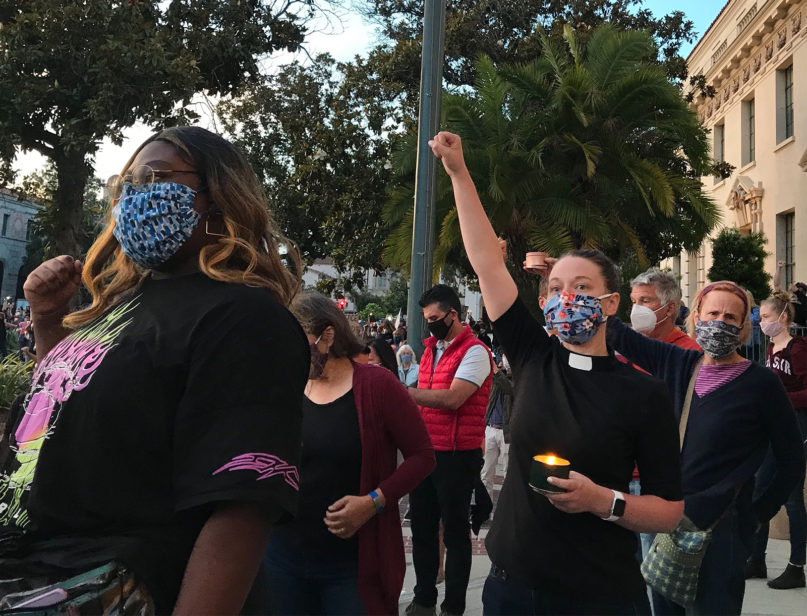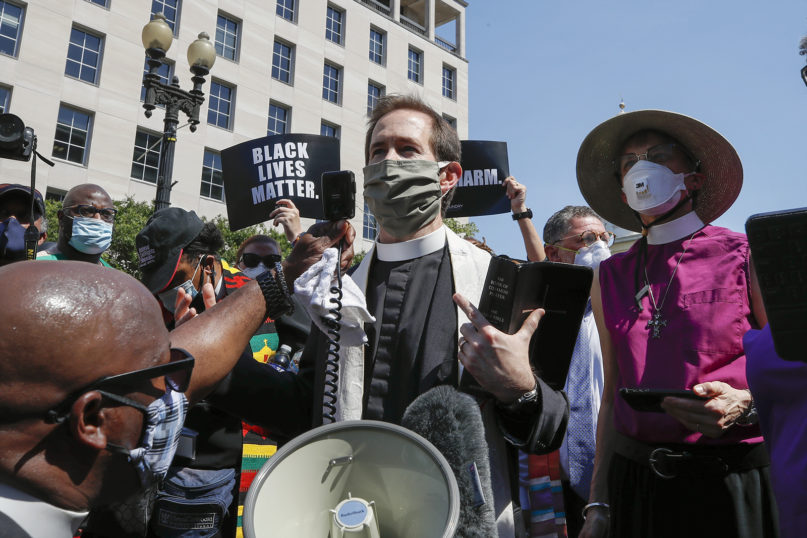(RNS) — At a prayer vigil held on Monday (June 1) outside St. John’s Episcopal Church in Washington, D.C., where President Trump used a Bible as a prop, clergy came out to pray and protest. Prayers were prayed. Kneeling happened. There were words from the Episcopal bishop of Washington, the Rt. Rev. Mariann Budde, and support from leaders of DC’s historic African American churches. There were signs for “Black Lives Matter” and others like “God hates racism.”
Protest is my act of intercession. Each of my steps is a prayer, asking God to heal our land. It is a ministry of presence, the call to bear witness and testify to God in the public square.
But my hope is that churches will regard protest as only the start of our response to racism. To testify in the public square that God grieved when George Floyd was killed, protest must be paired with sustained action. Raise signs, raise fists, yes! But we must see these protests as we do our baptism: a public expression of repentance and personal commitment to life with Jesus. But the test is in the life after this public expression to see if this commitment is actually lived out.
The church has so many resources at its disposal in terms of finances and people that can be put toward strategic action to change the racial climate of our society. I long for the church to see how much we have that we can use to help move toward the full flourishing of all of God’s people.
RELATED: Beyond the Most Segregated Hour
What can we do? How can we raise awareness in our congregations and our staffs to the ways we support racism in our everyday living?
A first step may be to take an honest inventory of ways that a faith community’s finances contribute to the subjugation of black folks. Churches that have an endowment or support a pension for staff can assess whether these funds’ investments pass a “justice audit” — do mutual funds offered for staff retirement accounts, for instance, invest in for-profit prisons? Having reviewed its own finances, the church may consider sharing its findings with its members and prompt them to check their personal finances.
We can also honor this week’s charged feelings by studying the history of our denominations, some of which once prevented black people and those of other races from attending their worship services. Perhaps, as an act of repentance for that history, your church can identify a local black, Latino, or immigrant church in an economically disadvantaged area and tithe 10% of its operating expenses to support the life of that church. Churches planning a large building project might consider tithing 10% of the cost of that new building to help build God’s church in other communities.

Faith leaders gather in support of racial justice in Pasadena, California, Sunday, May 31, 2020. RNS photo by Alejandra Molina
Look at the theologians, scholars and writers your church accesses for guest speakers, Bible studies and other forums. Does the list contain names from the black church or non-Western traditions? For next season’s events, invite non-white teachers like Lisa Sharon Harper at Freedom Road or Latasha Morrison at Be the Bridge. Try including books such as the late James Cone’s “The Cross and the Lynching Tree” in your next Christian formation class or other titles that might promote your congregation’s ability to see with a racialized lens. Browsing the (virtual) shelves at black-owned bookstores, such as Washington, D.C.’s Mahogany Books, can be an education in itself.
RELATED: Click here for complete coverage of the George Floyd protests on RNS
Look as well to your community beyond the church. When the church hires contractors or makes purchases, consider supporting black-owned businesses and entrepreneurs. For church events or for providing food for your parishioners in need, partner with a black-owned restaurant or caterer.
In many places, churches want to reach out to black or other minorities but are in a community that is racially isolated. It may be good to ponder why that is. What real estate practices, lending practices or other factors helped to contribute to the racial makeup of your community? What can your church do to engage with those questions in our community with city leaders? This is hard work that may take teaming with other churches and other faiths to negotiate real solutions.
But if the church is going to testify with its actions what it testifies in its baptism, then when the protests end, it will be time to begin.
(Nikki Toyama-Szeto is the executive director of Evangelicals for Social Action and co-editor of the books “More than Serving Tea: Asian American Women on Expectations, Relationships, Leadership and Faith” and “God of Justice.” The views expressed in this commentary do not necessarily reflect those of Religion News Service.)





